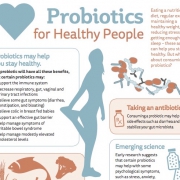What’s the evidence on ‘biotics’ for health? A summary from five ISAPP board members
Evidence on the health benefits of gut-targeted ‘biotics’ – probiotics, prebiotics, synbiotics, and postbiotics – has greatly increased over the past two decades, but it can be difficult to sort through the thousands of studies that exist today to learn which of these ingredients are appropriate in which situations. At a recent World of Microbiome virtual conference, ISAPP board members participated in a panel that provided an overview of what we currently know about the health benefits of ‘biotics’ and how they are best used.
Here’s a summary of what the board members had to say:
Dr. Mary Ellen Sanders: Probiotics and fermented foods
- Probiotics are “live microorganisms that, when administered in adequate amounts, confer a health benefit on the host”.
- Unfortunately, published assessments of probiotic products available on the market show that these products often fall short of required evidence. For example, their labels may not adequately describe the contents (including genus / species / strain in the product); they may not guarantee the efficacious dose through the end of the shelf life.
- Contrary to common belief, probiotics do not need to colonize in the target site (e.g. the gut), impact gut microbiota composition, be derived from humans, or be resistant to stomach acid and other gut secretions such as bile.
- Fermented foods are those made “through desired microbial growth and enzymatic conversions of food components”. The recent increased interest in fermented foods may come from people’s increased awareness of the role of gut microbes in overall health, but it is important to note that we have little direct evidence that the transient effects of fermented food microbes on the gut microbiota actually lead to health benefits. With that said, observational studies suggest that consuming some traditional fermented foods is associated with improved health outcomes.
Prof. Dan Merenstein, MD: Probiotics – How do I know what to prescribe for adult health?
- A (limited) survey showed that most dietary supplement probiotic products cannot be linked to evidence because they do not provide enough information to determine what evidence exists to support their use – especially strains in the product. However, there are some probiotic products that have robust evidence.
- Should every adult take a probiotic? The best evidence supports probiotics for improved lactose digestion and for prevention of difficile infection. Probiotics have also been shown to prevent common illnesses; reduce the duration of gut symptoms; and perhaps even reduce antibiotic consumption.
- Studies will reveal more about the microbiome and about how probiotics work, for whom and for what indications. As with diet, the answer will most likely not be same for each person.
Prof. Glenn Gibson: Prebiotics and Synbiotics
- A prebiotic is “a substrate that is selectively utilized by host microorganisms conferring a health benefit”. Researchers can test these substances’ activity in various ways: batch cultures, micro batch cultures, metabolite analysis, molecular microbiology methods, CF gut models, with in vivo (e.g. human) studies being required. Prebiotics appear to have particular utility in elderly populations, and may be helpful in repressing infections, inflammation and allergies. They have also been researched in clinical states such as IBS, IBD, autism and obesity related issues (Gibson et al., 2017).
- A synbiotic is “a mixture, comprising live microorganisms and substrate(s) selectively utilized by host microorganisms, that confers a health benefit on the host.” While more studies are needed to say precisely which are useful in which situations, synbiotics have shown promise for several aspects of health in adults (Swanson et al. 2020): surgical infections and complications, metabolic disorders (including T2DM and glycaemia), irritable bowel syndrome, Helicobacter pylori infection and atopic dermatitis.
Prof. Hania Szajewska, MD: Biotics for pediatric use
- Beneficial effects of ‘biotics’ are possible in pediatrics, but each ‘biotic’ needs to be evaluated separately. High-quality research is essential.
- It is important that we view the use of ‘biotics’ in the context of other things in a child’s life and other interventions.
- Breast milk is the best option for feeding infants
- If breastfeeding is not an option, infant formulae supplemented with probiotics and/or prebiotics and/or postbiotics are available on the market.
- Pro-/pre-/synbiotic supplemented formulae evaluated so far seem safe with some favorable clinical effects possible, but the evidence is not robust enough overall to be able to recommend routine use of these formulae.
- Evidence is convincing on probiotics for prevention of necrotizing enterocolitis in preterm infants.
- Medical societies differ in their recommendations for probiotics to treat acute gastroenteritis in children – they appear beneficial but not essential.
- Synbiotics are less studied, but early evidence indicates they may be useful for preventing sepsis in infants and preventing / treating allergy and atopic dermatitis in children.
Prof. Gabriel Vinderola: Postbiotics
- The concept of non-viable microbes exerting a health benefit has been around for a while, but different terms were used for these ingredients. Creating a scientific consensus definition will improve communication with health professionals, industry, regulators, and the general public. It will allow clear criteria for what qualifies as a postbiotic, and allow better tracking of scientific papers for future systematic reviews and meta-analyses.
- The ISAPP consensus definition (in press) of a postbiotic is: “A preparation of inanimate microorganisms and/or their components that confers a health benefit on the host”.
- Postbiotics are stable, so no cold-chain is needed to deliver them to the consumer. Safety is of less concern because the microbes are not alive and thus cannot cause bacteraemia.
- Research in the coming years will reveal more about postbiotics and the ways in which they can promote human health.
See here for the entire presentation on Biotics for Health.
Probiotics and fermented foods, by Dr. Mary Ellen Sanders (@1:15)
Postbiotics, by Prof. Gabriel Vinderola (@18:22)
Prebiotics and synbiotics, by Prof. Glenn Gibson (@33:24)
‘Biotics’ for pediatric use, by Prof. Hania Szajewska (@47:55 )
Probiotics: How do I know what to prescribe for adult health? by Prof. Dan Merenstein (@1:04:51)
Q&A (@1:20:00)















